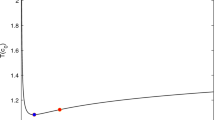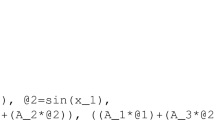Abstract
In this paper, a novel iterative adaptive dynamic programming (ADP) algorithm is developed to solve infinite horizon optimal control problems for discrete-time nonlinear systems. When the iterative control law and iterative performance index function in each iteration cannot be accurately obtained, it is shown that the iterative controls can make the performance index function converge to within a finite error bound of the optimal performance index function. Stability properties are presented to show that the system can be stabilized under the iterative control law which makes the present iterative ADP algorithm feasible for implementation both on-line and off-line. Neural networks are used to approximate the iterative performance index function and compute the iterative control policy, respectively, to implement the iterative ADP algorithm. Finally, two simulation examples are given to illustrate the performance of the present method.








Similar content being viewed by others
References
Abu-Khalaf M, Lewis FL (2005) Nearly optimal control laws for nonlinear systems with saturating actuators using a neural network HJB approach. Automatica 41(5):779–791
Adhyaru DM, Kar IN, Gopal M (2011) Bounded robust control of nonlinear systems using neural network-based HJB solution. Neural Comput Appl 20(1):91–103
Al-Tamimi A, Abu-Khalaf M, Lewis FL (2007) Adaptive critic designs for discrete-time zero-sum games with application to H ∞ control. IEEE Trans Syst Cybern B Cybern 37(1):240–247
Al-Tamimi A, Lewis FL (2007) Discrete-time nonlinear HJB solution using approximate dynamic programming: convergence proof. In: Proceedings of the IEEE symposium on approximate dynamic programming and reinforcement learning, pp 38–43
Al-Tamimi A, Lewis FL, Abu-Khalaf M (2008) Discrete-time nonlinear HJB solution using approximate dynamic programming: convergence proof. IEEE Trans Syst Man Cybern B Cybern 38(4):943–949
Beard R (1995) Improving the closed-loop performance of nonlinear systems. Ph.D Thesis, Rensselaer Polytechnic Institute, Troy, NY
Bertsekas DP, Tsitsiklis JN (1996) Neuro-dynamic programming. Athena Scientific, Belmont
Chen Z, Jagannathan S (2008) Generalized Hamilton–Jacobi–Bellman formulation-based neural network control of affine nonlinear discretetime systems. IEEE Trans Neural Netw 19(1):90–106
Enns R, Si J (2003) Helicopter trimming and tracking control using direct neural dynamic programming. IEEE Trans Neural Netw 14(8):929–939
Chen D, Yang J, Mohler RR (2008) On near optimal neural control of multiple-input nonlinear systems. Neural Comput Appl 17(4):327–337
Hagen S, Krose B (2003) Neural Q-learning. Neural Comput Appl 12(2):81–88
Huang T, Liu D (2013) A self-learning scheme for residential energy system control and management. Neural Comput Appl 22(2):259–269
Jin N, Liu D, Huang T, Pang Z (2007) Discrete-time adaptive dynamic programming using wavelet basis function neural networks. In: Proceedings of the IEEE symposium on approximate dynamic programming and reinforcement learning, pp 135–142
Lewis FL, Vrabie D (2009) Reinforcement learning and adaptive dynamic programming for feedback control. IEEE Circuits Syst Mag 9(3):32–50
Liao X, Wang L, Yu P (2007) Stability of dynamical systems. Elsevier Press, Amsterdam
Liu D, Javaherian H, Kovalenko O, Huang T (2008) Adaptive critic learning techniques for engine torque and air-fuel ratio control. IEEE Trans Syst Man Cybern B Cybern 38(4):988–993
Liu D, Zhang Y, Zhang H (2005) A self-learning call admission control scheme for CDMA cellular networks. IEEE Trans Neural Netw 16(5):1219–1228
Liu Z, Zhang H, Zhang Q (2010) Novel stability analysis for recurrent neural networks with multiple delays via line integral-type L-K functional. IEEE Trans Neural Netw 21(11):1710-1718
Luo Y, Zhang H (2008) Approximate optimal control for a class of nonlinear discrete-time systems with saturating actuators. Prog Nat Sci 18(8):1023–1029
Murray JJ, Cox CJ, Lendaris GG, Saeks R (2002) Adaptive dynamic programming. IEEE Trans Syst Man Cybern C Appl Rev 32(2):140–153
Prokhorov DV, Wunsch DC (1997) Adaptive critic designs. IEEE Trans Neural Netw 8(5):997–1007
Si J, Wang YT (2001) On-line learning control by association and reinforcement. IEEE Trans Neural Netw 12(2):264–276
Sutton RS, Barto AG (1998) Reinforcement learning: an introduction. The MIT Press, Cambridge
Song R, Zhang H (2013) The finite-horizon optimal control for a class of time-delay affine nonlinear system. Neural Comput Appl 22(2):229–235
Wang D, Liu D, Zhao D, Huang Y, Zhang D (2013) A neural-network-based iterative GDHP approach for solving a class of nonlinear optimal control problems with control constraints. Neural Comput Appl 22(2):219–227
Wang F, Jin N, Liu D, Wei Q (2011) Adaptive dynamic programming for finite-horizon optimal control of discrete-time nonlinear systems with ε-error bound. IEEE Trans Neural Netw 22(1):24–36
Wang F, Zhang H, Liu D (2009) Adaptive dynamic programming: an introduction. IEEE Comput Intell Mag 4(2):39–47
Watkins C (1989) Learning from delayed rewards. Ph.D Thesis, Cambridge University, Cambridge, England
Wei Q, Liu D (2012) Adaptive dynamic programming with stable value iteration algorithm for discrete-time nonlinear systems. In Proceedings of international joint conference on neural networks, Brisbane, Australia, 1–6
Wei Q, Liu D (2012) Finite-approximation-error based optimal control approach for discrete-time nonlinear systems. IEEE Trans Syst Man Cybern B Cybern. Available on-line: http://ieeexplore.ieee.org/stamp/stamp.jsp?tp=&arnumber=6328288
Wei Q, Liu D (2012) An iterative ε-optimal control scheme for a class of discrete-time nonlinear systems with unfixed initial state. Neural Netw 32:236–244
Wei Q, Zhang H, Dai J (2009) Model-free multiobjective approximate dynamic programming for discrete-time nonlinear systems with general performance index functions. Neurocomputing 72(7–9):839–1848
Werbos PJ (1977) Advanced forecasting methods for global crisis warning and models of intelligence. Gen Syst Yearbook 22:25–38
Werbos PJ (1991) A menu of designs for reinforcement learning over time. In: Miller WT, Sutton RS, Werbos PJ (eds) Neural networks for control. The MIT Press, Cambridge, pp 67–95
Werbos PJ (1992) Approximate dynamic programming for real-time control and neural modeling. In: White DA, Sofge DA, (eds) Handbook of intelligent control: neural, fuzzy, and adaptive approaches. Van Nostrand Reinhold, New York, ch. 13.
Zhang H, Liu Z, Huang G, Wang Z (2010) Novel weighting-delay-based stability criteria for recurrent neural networks with time-varying delay. IEEE Trans Neural Netw 21(1):91–106
Zhang H, Luo Y, Liu D (2009) The RBF neural network-based near-optimal control for a class of discrete-time affine nonlinear systems with control constraint. IEEE Trans Neural Netw 20(9):1490–1503
Zhang H, Quan Y (2001) Modeling identification and control of a class of nonlinear system. IEEE Trans Fuzzy Syst 9(2):349–354
Zhang H, Song R, Wei Q, Zhang T (2011) Optimal tracking control for a class of nonlinear discrete-time systems with time delays based on heuristic dynamic programming. IEEE Trans Neural Netw 22(12):1851–1862
Zhang H, Wei Q, Liu D (2011) An iterative adaptive dynamic programming method for solving a class of nonlinear zero-sum differential games. Automatica 47(1):207–214
Zhang H, Wei Q, Luo Y (2008) A novel infinite-time optimal tracking control scheme for a class of discrete-time nonlinear systems via the greedy HDP iteration algorithm. IEEE Trans Syst Man Cybern B Cybern 38(4):937–942
Acknowledgments
This work was supported in part by the National Natural Science Foundation of China under Grants 61034002, 61233001, 61273140, in part by Beijing Natural Science Foundation under Grant 4132078, and in part by the Early Career Development Award of SKLMCCS.
Author information
Authors and Affiliations
Corresponding author
Rights and permissions
About this article
Cite this article
Wei, Q., Liu, D. Stable iterative adaptive dynamic programming algorithm with approximation errors for discrete-time nonlinear systems. Neural Comput & Applic 24, 1355–1367 (2014). https://doi.org/10.1007/s00521-013-1361-7
Received:
Accepted:
Published:
Issue Date:
DOI: https://doi.org/10.1007/s00521-013-1361-7




